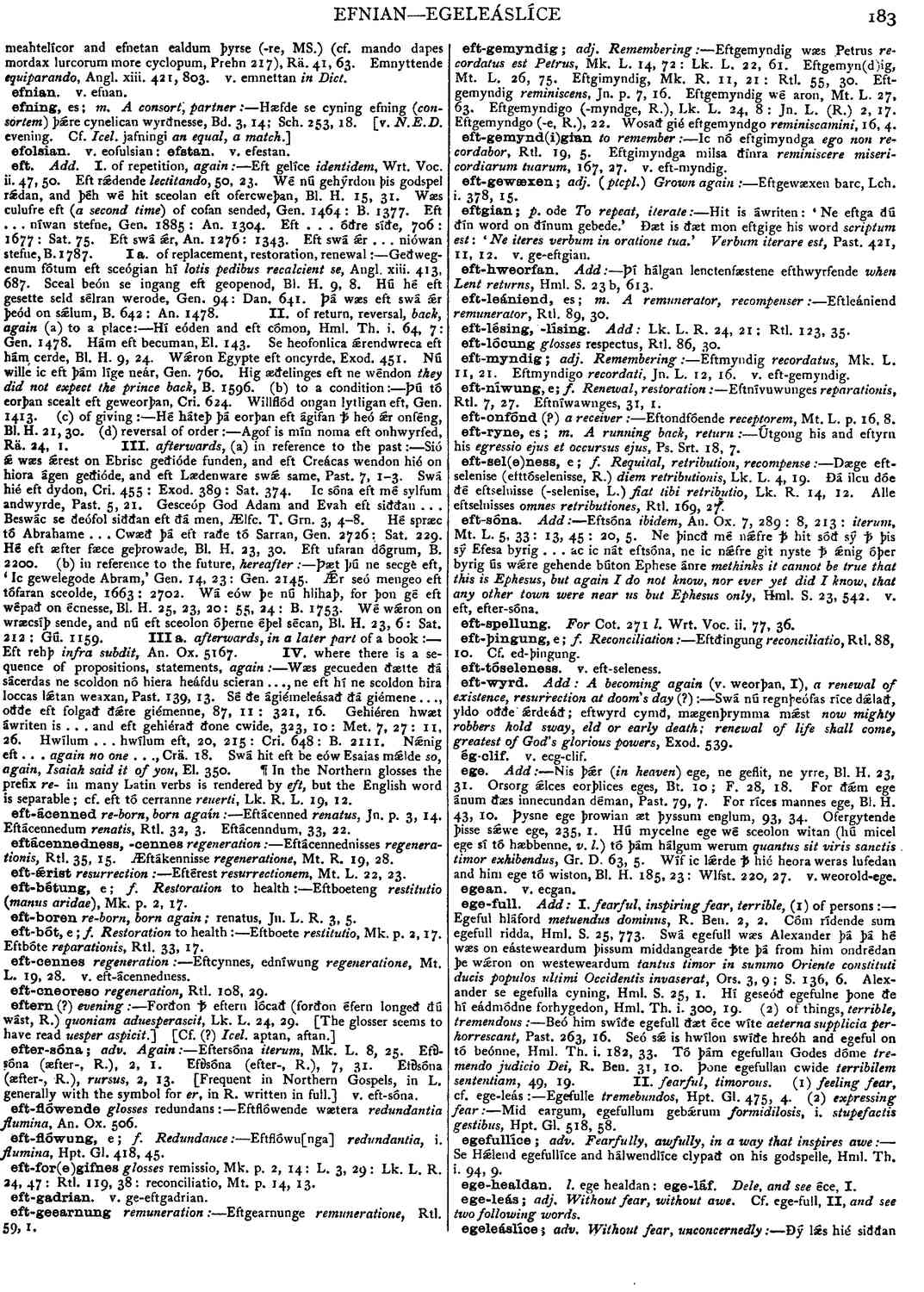eft
-
Eft gelíce
identidem,
- Wrt. Voc. ii. 47, 50.
-
Eft rǽdende
lectitando,
- 50, 23.
-
Wé nú gehýrdon þis godspel rǽdan, and þéh wé hit sceolan eft ofercweþan,
- Bl. H. 15, 31.
-
Wæs culufre eft (
a second time
) of cofan sended,- Gen. 1464: B. 1377.
-
Eft . . . níwan stefne,
- Gen. 1885: An. 1304.
- Eft . . . óðre síðe, 706: 1677: Sat. 75.
-
Eft swá ǽr,
- An. 1276: 1343.
-
Eft swá ǽr . . . niówan stefne, B. 1787. I a. of replacement, restoration, renewal :-- Geðwegenum fótum eft sceógian hí
lotis pedibus recalcient se,
- Angl. xiii. 413, 687.
-
Sceal beón se ingang eft geopenod,
- Bl. H. 9, 8.
-
Hú hé eft gesette seld sélran werode,
- Gen. 94: Dan. 641.
-
Þá wæs eft swá ǽr þeód on sǽlum,
- B. 642: An. 1478.
-
Hí eóden and eft cómon,
- Hml. Th. i. 64, 7: Gen. 1478.
-
Hám eft becuman,
- El. 143.
-
Se heofonlica ǽrendwreca eft hám cerde,
- Bl. H. 9, 24.
-
Wǽron Egypte eft oncyrde,
- Exod. 451.
-
Nú wille ic eft þám líge neár,
- Gen. 760.
-
Hig æðelinges eft ne wéndon
they did not expect the prince back,
- B. 1596.
-
Þú tó eorþan scealt eft geweorþan,
- Cri. 624.
-
Willflód ongan lytligan eft,
- Gen. 1413.
-
Hé háteþ þá eorþan eft ágifan ꝥ heó ǽr onféng,
- Bl. H. 21, 30.
-
Agof is mín noma eft onhwyrfed,
- Rä. 24, 1.
-
Sió ǽ wæs ǽrest on Ebrisc geðióde funden, and eft Creácas wendon hié on hiora ágen geðióde, and eft Lædenware swǽ same,
- Past. 7, 1-3.
-
Swá hié eft dydon,
- Cri. 455: Exod. 389: Sat. 374.
-
Ic sóna eft mé sylfum andwyrde,
- Past. 5, 21.
-
Gesceóp God Adam and Evah eft siððan . . . Beswác se ðeófol siððan eft ðá men,
- Ælfc. T. Grn. 3, 4-8.
-
Hé spræc tó Abrahame . . . Cwæð þá eft raðe tó Sarran,
- Gen. 2726: Sat. 229.
-
Hé eft æfter fæce geþrowade,
- Bl. H. 23, 30.
-
Eft ufaran dógrum,
- B. 2200.
- Þæt þú ne secge eft, 'Ic gewelegode Abram,' Gen. 14, 23: Gen. 2145.
- Ǽr seó mengeo eft tófaran sceolde, 1663: 2702.
-
Wá eów þe nú hlihaþ, for þon gé eft wépað on écnesse,
- Bl. H. 25, 23, 20: 55, 24: B. 1753.
-
Wé wǽron on wræcsíþ sende, and nú eft sceolon óþerne éþel sécan, Bl. H. 23, 6: Sat. 212: Gú. 1159. III a. afterwards, in a later part of a book :-- Eft rehþ
infra subdit,
- An. Ox. 5167.
-
Wæs gecueden ðætte ðá sácerdas ne scoldon nó hiera heáfdu scieran . . ., ne eft hí ne scoldon hira loccas lǽtan weaxan,
- Past. 139, 13.
-
Sé ðe ágiémeleásað ðá giémene . . ., oððe eft folgað ðǽre giémenne,
- 87, 11: 321, 16.
-
Gehiéren hwæt áwriten is . . . and eft gehiérað ðone cwide,
- 323, 10: Met. 7, 27: 11, 26.
-
Hwílum . . . hwílum eft,
- 20, 215: Cri. 648: B. 2111.
-
Nǽnig eft . . .
again no one . . .,
- Crä. 18.
-
Swá hit eft be eów Esaias mǽlde so, again, Isaiah said it of you, El. 350. ¶ In the Northern glosses the prefix re- in many Latin verbs is rendered by eft, but the English word is separable; cf. eft tó cerranne
reuerti,
- Lk. R. L. 19, 12.
Bosworth, Joseph. “eft.” In An Anglo-Saxon Dictionary Online, edited by Thomas Northcote Toller, Christ Sean, and Ondřej Tichy. Prague: Faculty of Arts, Charles University, 2014. https://bosworthtoller.com/43834.
Checked: 0